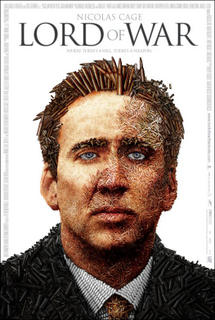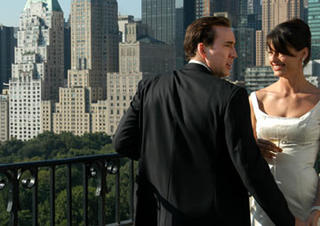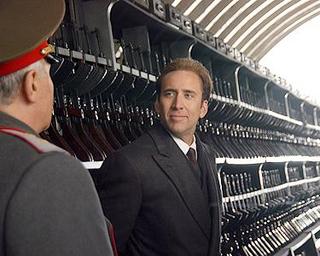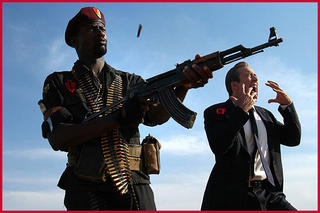Thursday, October 20, 2005
'Remember When We Used To Play, Bang Bang?'*: A Film Review Of 'Lord Of War'
'Arms-dealers will inherit the Earth, because everyone else is too busy killing each other.' - Nicolas Cage, playing Yuri Orlov, in this film.
'When the truth walks away,
Everybody stays,
Cause the truth about the world is that crime does pay.' - The Offspring, Have You Ever
I've spent much of the last three days trying to remember if I saw 'Gattaca.' I remember it being on telly, and I definitely remember considering watching it, but I can't work out if I did or not. I have a vague recollection that I did, and found it confusing, but that might be me remembering thinking it would be too confusing before deciding not to watch it. Who knows?
The reason for this speculation was the new film by 'Gattaca' director Andrew Niccol, 'Lord Of War.' Positive reviews have been circulating for a while, ever since its slightly disappointing entry into the US Box Office at number three.
Nicolas Cage plays Yuri Orlov, an international arms dealer who is forced to give a second look at his life's work as he is chased across the globe by Interpol agent Jack Valentine (bad name!), played by Ethan Hawke.

I'm torn on the poster artwork, because it is a very simple image, but I do think it's quite effective. Generally a thumbs-up.
Any doubts that this film will skirt around the issues are exploded, as it were, at the very beginning of this film. As the titles roll, in one of the most stunningly effective sequences in modern cinema, the camera follows a bullet, from it's creation, through the stages of its manufacture, into its shipment, on to a war zone, and then, in the end, into a young soldier's brain. Boom. Niccol even has the bullet pause, just slightly, in midair, so we can get a look at the soldier about to die. He's a young black African, who looks no more than sixteen. If you don't feel that emotional punch, then you may as well sell your soul, because you're dead inside already.
Cage narrates the film all the way through, and his narration starts of with the line, 'Don't worry. I'm not going to tell a pack of lies just to make me look good. I'm just going to tell what happened.' This is a crucial part of the film. Perhaps having an unbiased narrator seemed an excellent idea when writing the screenplay, but in fact I believe it would have been better to have had Orlov justifying his actions. The narration is perhaps too perfect in this regard - at one stage in the film, Orlov asks his brother, 'how many car salesmen go home and talk about their work? How many cigarette salesmen?' His point is that these people are able to leave their job at the office, and so should he be, but the comparison is more apt than that: car and cigarette salesmen, by and large, try to justify their job when they are asked. Orlov does very little of this in the dialogue, and none whatsoever in narration.

Cage's narration starts at the very opening of the film, and continues throughout. My qualms about Cage as a voice artist were completely assuaged - indeed, it turned out he had a terrific narration voice, but if I were to have another tiny criticism, maybe the frequency of the narration was a little disruptive at points.
Don't be concerned, however. Despite Orlov's disinclination to justify himself over much, there is no moralising the other way done. There's no self-flagellation of the kind that so infuriated me about, for instance, the allegedly immoral Hardenberg in the pitiful 'The Edukators.' Instead, we see two sides of the coin, and Niccol lets the audience decide for themselves. There are sympathetic parts of Orlov's character. He is born in the Ukraine, but moves to Little Odessa in New York. His family has had to pretend to be Jewish to get out of the Soviet Union, and he feels displaced and alone, without purpose or direction. He sells arms because he wants to do something meaningful with his life, something he'll be succesful at. We all feel this way at some point in our lives, and Orlov is a perfect example of a go-getter. He isn't content just feeling miserable - he goes out and does someting about it. Indeed, upon being asked why he does what he does, Orlov rejects the idea that the money matters, and simply shrugs, saying 'I'm good at it.'
Over time, Orlov inevitably becomes rich, and he becomes the most succesful privateer gun-runner in the world, eclipsing the old guard who rejected him before. He even gets the gal he's dreamed about, a difficult role ably played by Bridget Moynahan, and a young son who he loves. He clearly loves his family, and humanising the monster is a good ploy by Niccol, because it allows us in to Orlov's life just a little.

One slight problem is that parts of the film are actually too interesting. For instance, the interplay between Orlov and his wife would have borne a much deeper subplot, but at a running time of 122 minutes it's easy to see why no more was added.
Outside of the home, however, is where the problems lie. This film really does offer the viewer a fascinating tour on just what the arms trade involves. At one point, Cage, in the narration, informs the viewer that '$32 billion worth of arms were stolen from the Ukraine alone [after the Wall came dowm].' The staggering size of the arms trade is difficult to comprehend for people like me, but watching this, it is easy to see why so many munitions and armaments 'disappear' around the world.

That's what I call an arsenal!
The film wisely chooses a focal point after a while, focusing in on Orlov's dealings in Liberia. I suspect Niccol was writing the screenplay for this at the time of the now-all-but-forgotten civil war there recently, and I have to say I think he chose the perfect country for a look at the vileness of most of West Africa's ruling class.
The president in the film, Andre Baptiste, again played excellently by Eamonn Walker, is a fictional president, but his (and his sons) limb-hacking, heart-chomping introduction would perfectly fit any of the recnt leaders of the 'land of the blood bath' in recent years. In 1990, Prince Johnson, a friend of future leader Charles Taylor, had a friend film him cutting the ears off then-president Samuel Doe, before forcing him Doe to eat them. Johnson also allegedly ate Doe's manhood, because it is believed in parts of West Africa that doing so increases one's personal strength. In fairness, Johnson later apologised to Doe's widow, but it was a bit late by then. By the time the civil war reached its peak in 2003, there were three parties involved, one led by the president Taylor, one by Prince Johnson, now on completely different sides, and one by a different warlord called Roosevelt Johnson, who was no relation. They were all equally revolting.

Eamonn Walker is excellent as (fictional) loathsome leader Andre Baptiste. During the course of the film, we see him shoot a man for no reason, hear about his limb-hacking pastime, and watch as his men raid a truck full of UN aid. Sadly, it's an all-too accurate charcterisation.
All the countries in West Africa suffer from these problems, and the only people who suffer are the ordinary citizens of the nations, who are betrayed at every step by power-hungry warlords. Orlov admits this, saying 'often the worst crimes are committed when both parties call themselves 'freedom fighters.'' It is there, in West Africa, that Orlov has his only real moment of conscience in the whole film. Ironically, it is induced by excessive consumption of cocaine and even 'brown-brown', cocaine cut with gunpowder. This is a brilliantly powerful scene. Orlov can't bear the sight of a girl with no arm asking 'will my hand will grow back?' This is where films like this really work. As a connoisseur of horror, no amount of gore can upset me at all, but films like this and 'Hotel Rwanda', with their unflinching portrayal of the real effects of conflict, are where genuine discomfort lies.

The leader of the 'freedom fighters' (read mass murderers) starts firing the merchandise.
However, Niccol admirably performs a balancing act. Part of our engagement with Orlov as a character comes through the strong use of humour throughout the film. In places, it really is genuinely very funny. I have no wish to spoil all the jokes for you, because you should see this film, but I would like to give one. On being told that there are peace talks in one part of the world, Orlov barks into his mobile phone, 'OK, I'll reroute the ship to the Balkans. At least when they say there's going to be a war, they keep their word.' Strong stuff. Also providing a few laughs, though somewhat more disconcertingly, is Andre Baptiste's son, of the same name, who is desperate to obtain 'the gun of Rambo.' Style is all-important to the truly evil.
I would recommend 'Lord Of War' very strongly. It's Cage fulfilling a good, serious role, proving that his performance in the excellent 'Matchstick Men' was no one-off. It is also a serious film, about a serious issue, which manages to find its own level of respectful humour, which will keep you fully entertained for every minute of its running time. You may even, like me, find yourself just pricking a tear at the ending.
*Nancy Sinatra, 'Bang Bang.' Obviously.
'When the truth walks away,
Everybody stays,
Cause the truth about the world is that crime does pay.' - The Offspring, Have You Ever
I've spent much of the last three days trying to remember if I saw 'Gattaca.' I remember it being on telly, and I definitely remember considering watching it, but I can't work out if I did or not. I have a vague recollection that I did, and found it confusing, but that might be me remembering thinking it would be too confusing before deciding not to watch it. Who knows?
The reason for this speculation was the new film by 'Gattaca' director Andrew Niccol, 'Lord Of War.' Positive reviews have been circulating for a while, ever since its slightly disappointing entry into the US Box Office at number three.
Nicolas Cage plays Yuri Orlov, an international arms dealer who is forced to give a second look at his life's work as he is chased across the globe by Interpol agent Jack Valentine (bad name!), played by Ethan Hawke.

I'm torn on the poster artwork, because it is a very simple image, but I do think it's quite effective. Generally a thumbs-up.
Any doubts that this film will skirt around the issues are exploded, as it were, at the very beginning of this film. As the titles roll, in one of the most stunningly effective sequences in modern cinema, the camera follows a bullet, from it's creation, through the stages of its manufacture, into its shipment, on to a war zone, and then, in the end, into a young soldier's brain. Boom. Niccol even has the bullet pause, just slightly, in midair, so we can get a look at the soldier about to die. He's a young black African, who looks no more than sixteen. If you don't feel that emotional punch, then you may as well sell your soul, because you're dead inside already.
Cage narrates the film all the way through, and his narration starts of with the line, 'Don't worry. I'm not going to tell a pack of lies just to make me look good. I'm just going to tell what happened.' This is a crucial part of the film. Perhaps having an unbiased narrator seemed an excellent idea when writing the screenplay, but in fact I believe it would have been better to have had Orlov justifying his actions. The narration is perhaps too perfect in this regard - at one stage in the film, Orlov asks his brother, 'how many car salesmen go home and talk about their work? How many cigarette salesmen?' His point is that these people are able to leave their job at the office, and so should he be, but the comparison is more apt than that: car and cigarette salesmen, by and large, try to justify their job when they are asked. Orlov does very little of this in the dialogue, and none whatsoever in narration.

Cage's narration starts at the very opening of the film, and continues throughout. My qualms about Cage as a voice artist were completely assuaged - indeed, it turned out he had a terrific narration voice, but if I were to have another tiny criticism, maybe the frequency of the narration was a little disruptive at points.
Don't be concerned, however. Despite Orlov's disinclination to justify himself over much, there is no moralising the other way done. There's no self-flagellation of the kind that so infuriated me about, for instance, the allegedly immoral Hardenberg in the pitiful 'The Edukators.' Instead, we see two sides of the coin, and Niccol lets the audience decide for themselves. There are sympathetic parts of Orlov's character. He is born in the Ukraine, but moves to Little Odessa in New York. His family has had to pretend to be Jewish to get out of the Soviet Union, and he feels displaced and alone, without purpose or direction. He sells arms because he wants to do something meaningful with his life, something he'll be succesful at. We all feel this way at some point in our lives, and Orlov is a perfect example of a go-getter. He isn't content just feeling miserable - he goes out and does someting about it. Indeed, upon being asked why he does what he does, Orlov rejects the idea that the money matters, and simply shrugs, saying 'I'm good at it.'
Over time, Orlov inevitably becomes rich, and he becomes the most succesful privateer gun-runner in the world, eclipsing the old guard who rejected him before. He even gets the gal he's dreamed about, a difficult role ably played by Bridget Moynahan, and a young son who he loves. He clearly loves his family, and humanising the monster is a good ploy by Niccol, because it allows us in to Orlov's life just a little.

One slight problem is that parts of the film are actually too interesting. For instance, the interplay between Orlov and his wife would have borne a much deeper subplot, but at a running time of 122 minutes it's easy to see why no more was added.
Outside of the home, however, is where the problems lie. This film really does offer the viewer a fascinating tour on just what the arms trade involves. At one point, Cage, in the narration, informs the viewer that '$32 billion worth of arms were stolen from the Ukraine alone [after the Wall came dowm].' The staggering size of the arms trade is difficult to comprehend for people like me, but watching this, it is easy to see why so many munitions and armaments 'disappear' around the world.

That's what I call an arsenal!
The film wisely chooses a focal point after a while, focusing in on Orlov's dealings in Liberia. I suspect Niccol was writing the screenplay for this at the time of the now-all-but-forgotten civil war there recently, and I have to say I think he chose the perfect country for a look at the vileness of most of West Africa's ruling class.
The president in the film, Andre Baptiste, again played excellently by Eamonn Walker, is a fictional president, but his (and his sons) limb-hacking, heart-chomping introduction would perfectly fit any of the recnt leaders of the 'land of the blood bath' in recent years. In 1990, Prince Johnson, a friend of future leader Charles Taylor, had a friend film him cutting the ears off then-president Samuel Doe, before forcing him Doe to eat them. Johnson also allegedly ate Doe's manhood, because it is believed in parts of West Africa that doing so increases one's personal strength. In fairness, Johnson later apologised to Doe's widow, but it was a bit late by then. By the time the civil war reached its peak in 2003, there were three parties involved, one led by the president Taylor, one by Prince Johnson, now on completely different sides, and one by a different warlord called Roosevelt Johnson, who was no relation. They were all equally revolting.

Eamonn Walker is excellent as (fictional) loathsome leader Andre Baptiste. During the course of the film, we see him shoot a man for no reason, hear about his limb-hacking pastime, and watch as his men raid a truck full of UN aid. Sadly, it's an all-too accurate charcterisation.
All the countries in West Africa suffer from these problems, and the only people who suffer are the ordinary citizens of the nations, who are betrayed at every step by power-hungry warlords. Orlov admits this, saying 'often the worst crimes are committed when both parties call themselves 'freedom fighters.'' It is there, in West Africa, that Orlov has his only real moment of conscience in the whole film. Ironically, it is induced by excessive consumption of cocaine and even 'brown-brown', cocaine cut with gunpowder. This is a brilliantly powerful scene. Orlov can't bear the sight of a girl with no arm asking 'will my hand will grow back?' This is where films like this really work. As a connoisseur of horror, no amount of gore can upset me at all, but films like this and 'Hotel Rwanda', with their unflinching portrayal of the real effects of conflict, are where genuine discomfort lies.

The leader of the 'freedom fighters' (read mass murderers) starts firing the merchandise.
However, Niccol admirably performs a balancing act. Part of our engagement with Orlov as a character comes through the strong use of humour throughout the film. In places, it really is genuinely very funny. I have no wish to spoil all the jokes for you, because you should see this film, but I would like to give one. On being told that there are peace talks in one part of the world, Orlov barks into his mobile phone, 'OK, I'll reroute the ship to the Balkans. At least when they say there's going to be a war, they keep their word.' Strong stuff. Also providing a few laughs, though somewhat more disconcertingly, is Andre Baptiste's son, of the same name, who is desperate to obtain 'the gun of Rambo.' Style is all-important to the truly evil.
I would recommend 'Lord Of War' very strongly. It's Cage fulfilling a good, serious role, proving that his performance in the excellent 'Matchstick Men' was no one-off. It is also a serious film, about a serious issue, which manages to find its own level of respectful humour, which will keep you fully entertained for every minute of its running time. You may even, like me, find yourself just pricking a tear at the ending.
*Nancy Sinatra, 'Bang Bang.' Obviously.



